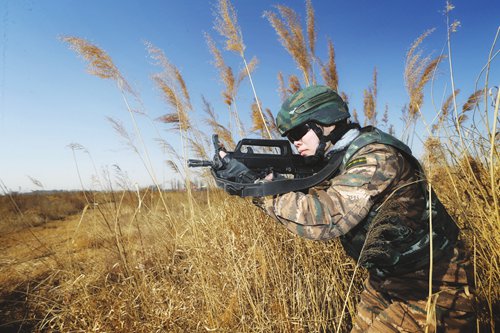
At 1 am in the dead of night, an air of tension spreads over the dark, quiet field. Zhang Chao, a member of the special armed police, disguises himself as a medical worker as he approaches the hijacked bus. Two warning shots from the vehicle break the silence. After being carefully examined, interrogated and searched, Zhang Chao is allowed to board the bus to treat the hostages, who have come down with a sudden illness. He calmly treats them and tries to talk to the hijackers, while secretly gauging the situation inside and looking for suspected explosive devices.
"We chat with the criminals and gain more time to gauge the details inside the bus, such as position, posture and even expression of every hostage. We need to be vigilant for gunmen hiding among the hostages," Zhang Chao reminded his comrades-in-arms.
The two masked gunmen - according to the script - are terrorists from the Eastern Turkistan Islamic Movement (ETIM) who have hijacked a bus carrying 13 passengers and are demanding the release of their leader and an end to the operation. In a nearby corner, commandos stand ready to confront the gunmen, who they had been fighting for nearly eight hours.
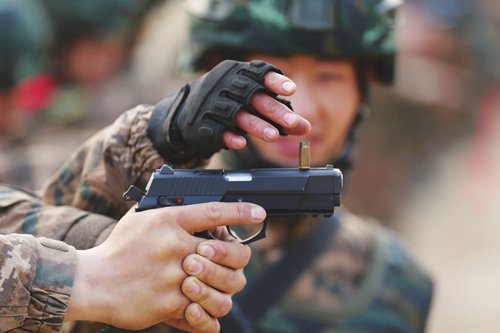
You could be forgiven for thinking this was a scene from an action blockbuster. It is actually part of a week-long intensive training course called "Devil's Week" for China's Falcon Commando Unit, widely renowned as the country's top counterterrorism force.
"Devil's Week" has become a tradition for China's armed forces, conducted quarterly, held under different combat environments and training priorities depending on the season and climate. It usually features high-intensity and high-energy training that aims to strengthen troops' combat ability. But this time, the situation is a little different.
Now, the focus is more on team members solving highly complex problems and dealing with a variety of traps. The mental challenges facing the troops are far more demanding than the usual tests of physical strength and endurance.
Scientific path
The Falcon Commando Unit, part of the paramilitary People's Armed Police, specializes in counterterrorist operations, including fast entry rappelling, evasive driving and pursuit, hostage rescue and close quarter combat.
For the last few years, Falcon has made a bold attempt to highlight tactical integration and strengthen confrontational drills, and have scaled back on purely physical exercises that could be carried out in barracks.
Zhang Ling, the head of the Investigation Department, who is in charge of the general planning, told the Global Times that priority is now given to practical skills and intelligence training in the design of the training subjects, in particular since 2017 when the Central Military Commission emphasized the importance of practical and confrontational exercises. The percentage of purely physical exercise programs has decreased from 40 percent to 20 percent.
"Now, it's more scientific and more in line with the future trend in the modern military world than the earlier extreme physical tests," Zhang Ling said.
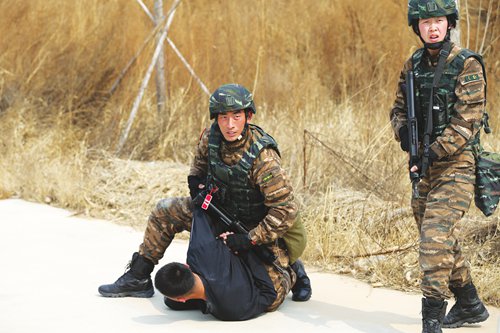
The first simulated anti-hijacking drill lasted nearly 12 hours until midnight on the first day, and followed the standard operations of reconnaissance, assault, bomb disposal and search and rescue. The drill aims to familiarize soldiers with standard operating procedures that require close and well-prepared cooperation between all members during an operation.
During the anti-terror simulation, Zhang Ling repeatedly grilled commanders on every operation plan they submitted, demanding to know how confident they were in it.
"What I want is not a single number that comes directly out of their mouths, but a probability that comes out after careful thinking and scientific calculation," he explained, stressing that the ability to analyze and judge the situation had become the focus of the test.
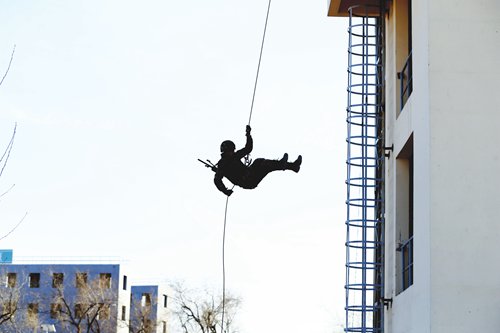
Combat times of 10 hours or more also serve as a psychological test for the team. Unlike the "quick fix" that most people imagine, real anti-terror operations often drag on until late at night, as dark conditions are better for launching an assault on terrorists, Zhang Ling explained.
As energy levels drop, the plan is constantly contradicted, and some soldiers start to appear anxious and depressed. The drop in morale presents a challenge for everyone involved.
"This situation is actually more energy-consuming and challenging than purely physical exercises," he said.
Meeting global standards
More of the elements in the intensive training program are designed to meet the current international counter-terrorism situation. When coming up with the script of the simulated case, the team of directors always uses international anti-terrorism cases as reference. For example, this anti-hijacking script is based on a successful operation carried out by Italy's Gruppo di Intervento Speciale (GIS). "If our performance is inferior to our foreign peers, then deep reflection is required," Zhang Ling said.
The script even includes a female terrorist. The global anti-terror situation is more complex nowadays, Zhang Ling explains, and female terrorists are more common.

"We have even used a child as a 'terrorist,' because we saw many cases abroad where children were strapped with bombs. As a special force, you need to be clear all the time that your judgement won't be affected by anyone's age or gender," Zhang Ling said.
Training methods are also becoming increasingly digital. The use of drones to carry out bomb attacks has become more common in the international community. In response, the Falcon commandos are learning how to capture and destroy this new potential weapon of choice for terrorists.
Danger everywhere
On their third day of training, troops went on a 30-kilometer march, where they were exposed to attacks by stun grenades and smoke bombs at any time. A wrong step could set off a "landmine," and a troop slacking off could become vulnerable to "terrorist" gunfire, testing the force's combat ability.
Wang Xiyu, the head of the "Blue Army," a group that usually plays the enemy to the PLA's "Red Army" in the confrontation drills, told the Global Times that their primary task is to find weaknesses, and increase the difficulty and complexity by setting traps so as to sharpen the "Red Army's" combat skills.
Wang usually goes online to collect information on foreign counter-terrorism cases for discussion and analysis. They also look to military TV shows and movies for tactics and inspiration.
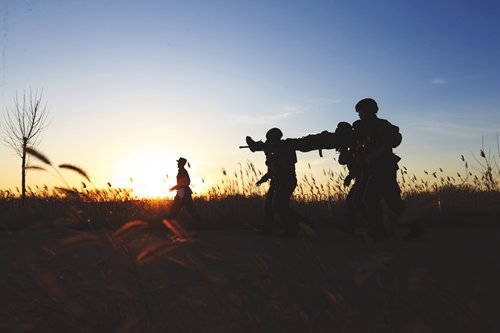
In recent years, the Falcons' selection process has become increasingly demanding.
Only high-performing members of the armed police force who have done two full years of service are eligible for the entry examination.
Successful candidates are admitted into the Special Police Academy of the Chinese People's Armed Police Forces, the cradle of special operations talent.
After four years of both academic and military study, a further 6 percent of unqualified candidates are filtered out. Those who successfully make it through the final graduate examination are able to become formal members.
The strict admission process explains why the Falcons have been able to repeatedly win major international competitions on behalf of China.
The brigade has represented China's Armed Police three times in world-class competitions, including Jordan's Warrior Competition and The Sniper World Cup in Hungary, winning seven gold and five silver medals for the country.









